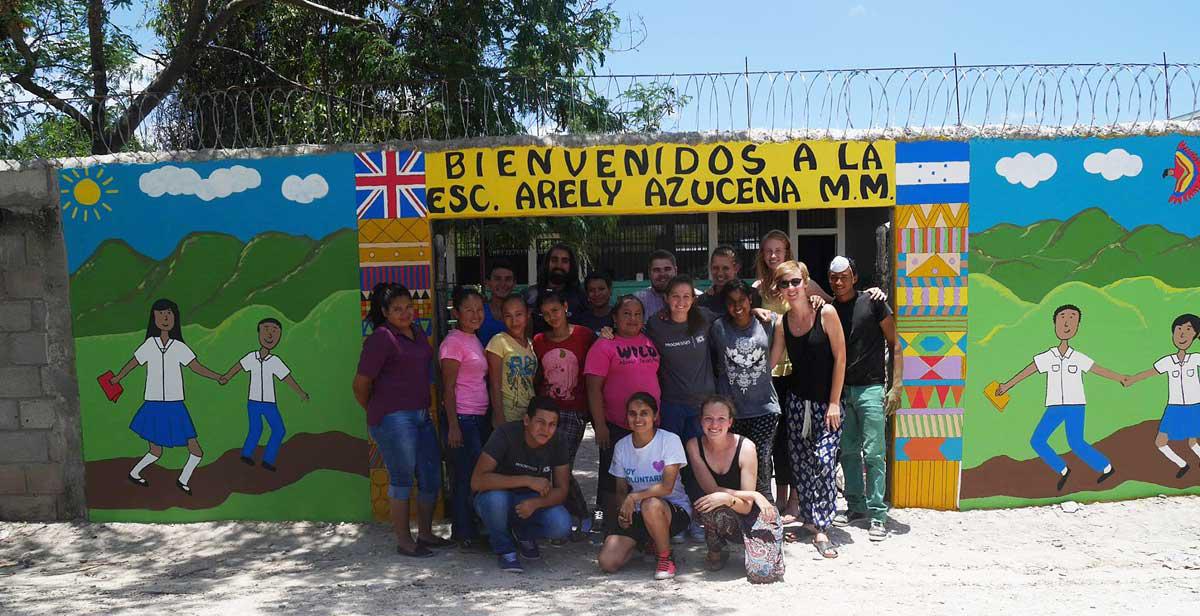It’s nearly 5pm, and three other volunteers and I are standing in a classroom with an excited crowd of kids around us asking questions about English, scribbling the answers down in their notebooks. English Club and the school day technically finished at 4pm, but after we packed up, the children wanted to learn more from the topic of that day (professions: what do you want to be when you grow up?). As they leave they each give us big hugs with big smiles, whilst chirping “see you tomorrow!”
This seems quite a distinction from how the Director of the small school in San Benito, Honduras, describes things before Progressio and Glasswing volunteers arrived to work there earlier this year, undertaking a project of three 12-week cycles. They often had trouble getting the children to come to school at all, with attendance rates low and teachers struggling with insufficient resources and support to be able to make learning engaging. The school looked (literally) grey and dreary, with nothing for the kids to play with in their break time and the only green(ish) space to run around constantly flooding whenever it rains.
This is a reflection of the context that this, and the majority of, communities like San Benito find themselves in in Honduras. It’s a tiny community, and you’d be forgiven for thinking the word tiny also echoes its low status on the priority list, due to its lack of receiving basic infrastructure investment such as functional water pipes and paved roads.
Finding ourselves in this very different reality to the one we are used to back home, the UK volunteers have learnt so much from our surroundings: equally the political and social context, as the attitude of the community and the limitless love and affection given to us by the children. The experience has been made even richer by working side-by-side with Honduran volunteers, who always bring indispensable knowledge and enthusiasm to the team. Working in a cross-cultural group is challenging, but the mix of backgrounds and cultures have meant we could achieve so much with the eclectic mix of ideas and experiences. It’s shown us that even coming from such different circumstances, the joint passion and commitment of young people can overcome any barriers.
The two cycles of volunteers so far in San Benito have been working on improving the infrastructure of the school, from simple things like painting the surroundings to brighten it up, to building a playground for the kids to play on when not in class and constructing a drainage system.
The school is supposed to be the focal point of the community, but before the volunteers arrived the outside and the entrance was just grey breezeblocks with big metal gates and barbed wire. We felt that this wasn’t helping the kids feel excited about coming to school every day, so we painted a welcoming mural, with bright colours and children skipping joyfully into school - hoping to create a positive atmosphere and give the kids a happy start to their day. The best thing about the mural is that we only painted a reflection of what we saw: the beautiful surroundings, and the children running eagerly up to us every morning, making us feel so welcome in their school and their community. We thought that the kids deserve to receive the same feeling from the place they will spend much of their childhood and that will help shape them as human beings.
As well as putting on many workshops and events, our other main focus in the project is running afterschool clubs for the kids. There are five clubs: English, Glee, Art, Discovery and Football, all managed by Honduran and UK volunteers. The clubs have a dual focus: on the surface, they’re for the kids to have fun, keep occupied after school, learn new things, and increase day-to-day attendance. But deeper goals, perhaps natural positive side-effects, are the self-confidence the kids gain, the social skills, the increased enthusiasm for learning and, in a country where young people face huge challenges, hopefully some assistance for them to stay on the right path.
It can be hard to see the impact of your work in this setting, especially when you’re only participating in a part of the project and you won’t see it from beginning to end. Besides, many impacts are seeds that get planted and flourish in the longer-term. But what has been special about this particular project in San Benito is despite all the hopes the volunteers have for some of the future impact we’ll probably never see, there’s so much feedback and positive things we can see around us that make the hard work and challenges worth it.
Having the kids wanting to stay longer after English Club felt like a very personal achievement for both the UK and Honduran volunteers running the club. In a reflection session at the beginning of the cycle, some kids took our plea for honesty very seriously and hit us with comments like “I hate English” and “I’m only here because my Mum said I had to be in a club”. For those same children to later reward us with smiling faces, clearly improved confidence and English skills and even a word or two about how fun English is, is a priceless reminder of the small but very real impact that our work is having in that school.
And who knows? Maybe those children will be inspired enough in this short time to continue with English, or art or football, and will be able to achieve their dreams of becoming ambassadors, teachers, engineers… the dreams they told us about that time in English Club.
Written by ICS Team Leader Ellie Wason (July - September 2016 cycle, San Benito, Honduras)



